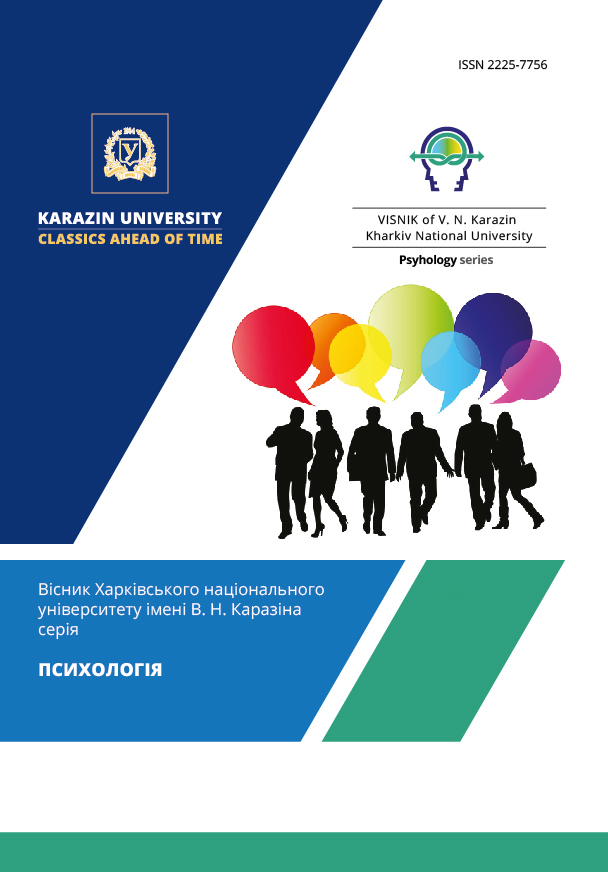Participative Interaction Between Specialists and Parents in Early Intervention During the War in Ukraine
Abstract
The article examines the life and professional situation in which early intervention specialists found themselves at the beginning of the war in Ukraine, their needs and features of providing early intervention services to families during wartime. A model of participatory interaction between specialists and the family in early intervention was also built, on the basis of which the checklist "Implementation of early intervention family plan: meeting with the family" was created. Questionnaire and modeling methods were used. Specialists from Kharkiv, Zakarpattia, Odesa, Lviv, Donetsk, Luhansk regions and Vinnytsia were involved (N=76). 52.6% of the surveyed specialists were forced to change their place of residence after leaving the territory of active hostilities. Among those who left, 17.1% of specialists were abroad. 81.6% of specialists continued to work, of which 74.19% - provided RV service, despite the war and forced resettlement. The results of the questionnaire became the basis for creating a model of participatory interaction and its operationalization in the form of a checklist, which consists of five sections that reflect the sequence of actions of specialists: transdisciplinary team, preparation for a meeting with the family, greetings, implementation of goals and support of parents, summarizing and planning the next meeting .The developed checklist is based on evidence-based practices of early intervention and allows to ensure the measurability of participative interaction, which ensures the quality of meetings during the implementation of the family plan of early intervention and their compliance with recommended practices. In the conclusions, the structure of the needs of emergency personnel during the war in Ukraine was determined: obtaining new knowledge about accompanying families and children during the war, knowledge about trauma and work with it, communication with colleagues, financial and material needs, the need for emotional support to prevent emotional burnout; the checklist "Implementation of early intervention family plan: meeting with the family" was substantiated and developed, which allows operationalizing the concept of participatory interaction in early intervention.
Downloads
References
Balabanova, L.M., Perelighina, L.A. (2022). Technologies for restoring the socio-psychological resources of the vitality of an individual who is experiencing the consequences of traumatic events. Aktualni doslidzhennia v suchasnii vitchyznianii ekstremalnii ta kryzovii psykholohii : monohrafiia. / za red. V.P. Sadkovoho, O.V. Timchenka. X. : Panov L.M., P. 110-126. http://repositsc.nuczu.edu.ua/handle/123456789/16640 [In Ukrainian]
Bayard, R., Mahashvili, N., Javakhishvili, J. (2017). Hidden consequences of conflict. Mental health problems and access to services among internally displaced persons in Ukraine. Tbilisi: International Alert. [In Ukrainian]
Diagnosis, therapy and prevention of medical and psychological consequences of hostilities in modern conditions. / P.V. Voloshyn et al. Kh.: State University "Institute of Neurology, Psychiatry and Narcology of the National Academy of Sciences of Ukraine", 2014. https://inpn.org.ua/uploads/files/ [In Ukrainian]
Guralnick, M.J. (2011). Why Early Intervention Works: A Systems Perspective. Infants Young Child. Jan 1;24(1):6-28. https://doi.org/10.1097/IYC.0b013e3182002cfe.
Kukuruza, G.V. (2013). A psychological model of early intervention: helping families raising young children with developmental disabilities: monograph. Kharkiv. [In Ukrainian]
Lahad, M. (2017). From victim to victor: The development of the BASIC PH model of coping and resiliency. Traumatology, 23(1). Р. 27–34. https://doi.org/10.1037/trm0000105
Lazarenko, V.O. (2017). Narrative as a means of reinterpreting life events in the context of the problem of a person's adaptation to the consequences of a military conflict. Problemy politychnoi psykholohii, 5(19). P.25-32. https://politpsy.org/index.php/popp/issue/view/7/ [In Ukrainian]
Ministry of Social Policy: 70% of children from families covered by early intervention are successfully socialized. 2022. URL.: https://www.kmu.gov.ua/news/70-ditej-z-simej-ohoplenih-rannim-vtruchannyam-uspishno-socializuyutsya [In Ukrainian]
Mintser, O.P., Myronenko, N.V., Sinyenko, N.O., Novyk, A.M. (2019). Patient participation as an element of ensuring the safety of medical care: features of the remote format. Medical informatics and engineering. 4. P. 76–79. https://doi.org/10.11603/mie.1996-1960.2019.4.11024 [In Ukrainian]
Panchenko, T.L., Zaplatinska, A.B. (2018). Early intervention as a system of comprehensive care for children of early and preschool age. Narodna osvita. 3. P. 12-18. URL.: http://nbuv.gov.ua/UJRN/NarOsv_2018_3_4 [In Ukrainian]
Pleskach, B.V., Urkaev, V.S. (2017). Socio-psychological aspects of psychotherapeutic assistance to internally displaced persons. Aktualni problemy psykholohii. Konsultatyvna psykholohiia i psykhoterapiia. 3(13). P. 74 – 91. https://lib.iitta.gov.ua/711272/1/Pleskach_Urkaev2017.pdf [In Ukrainian]
Puerto Martínez, E. (2020). Evolución histórica de la Atención temprana. Aula de Encuentro, V. 22 (1). Р. 318-337. https://doi.org/10.17561/ae.v22n1.12
Rifkin, S.B., Kangere, M. What is Participation? URL: https://www.researchgate.net/publication/311607512_What_is_Participation
Surina, A. (2017). The concept of "participation": genesis and relevance. Politolohiia. Visnyk Dnipropetrovskoho universytetu. 1. P. 55-63. URL.: http://nbuv.gov.ua/UJRN/vdufsp_2017_1_9 [In Ukrainian]
Tytarenko, T. M. (2020). Post-traumatic life creation: methods of achieving psychological well-being: monograph / Natsionalna akademiia pedahohichnykh nauk Ukrainy, Instytut sotsialnoi ta politychnoi psykholohii. Kropyvnytskyi : Imeks-LTD. [In Ukrainian]




